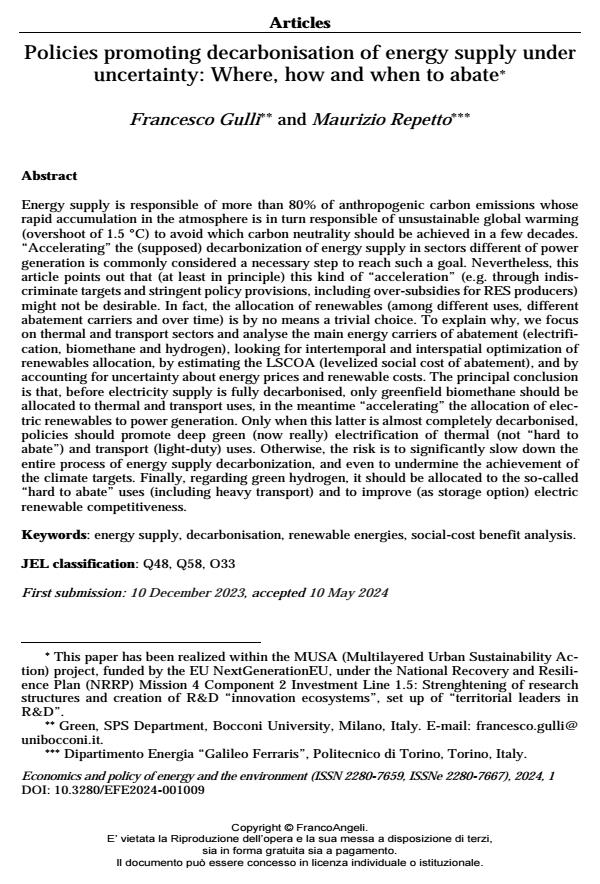Policies promoting decarbonisation of energy supply under uncertainty: Where, how and when to abate
Titolo Rivista ECONOMICS AND POLICY OF ENERGY AND THE ENVIRONMENT
Autori/Curatori Francesco Gullì, Maurizio Repetto
Anno di pubblicazione 2024 Fascicolo 2024/1
Lingua Inglese Numero pagine 40 P. 131-170 Dimensione file 406 KB
DOI 10.3280/EFE2024-001009
Il DOI è il codice a barre della proprietà intellettuale: per saperne di più
clicca qui
Qui sotto puoi vedere in anteprima la prima pagina di questo articolo.
Se questo articolo ti interessa, lo puoi acquistare (e scaricare in formato pdf) seguendo le facili indicazioni per acquistare il download credit. Acquista Download Credits per scaricare questo Articolo in formato PDF

FrancoAngeli è membro della Publishers International Linking Association, Inc (PILA)associazione indipendente e non profit per facilitare (attraverso i servizi tecnologici implementati da CrossRef.org) l’accesso degli studiosi ai contenuti digitali nelle pubblicazioni professionali e scientifiche
Energy supply is responsible of more than 80% of anthropogenic carbon emissions whose rapid accumulation in the atmosphere is in turn responsible of unsustainable global warming (overshoot of 1.5 °C) to avoid which carbon neutrality should be achieved in a few decades. “Accelerating” the (supposed) decarbonization of energy supply in sectors different of power generation is commonly considered a necessary step to reach such a goal. Nevertheless, this article points out that (at least in principle) this kind of “acceleration” (e.g. through indis- criminate targets and stringent policy provisions, including over-subsidies for RES producers) might not be desirable. In fact, the allocation of renewables (among different uses, different abatement carriers and over time) is by no means a trivial choice. To explain why, we focus on thermal and transport sectors and analyse the main energy carriers of abatement (electrifi- cation, biomethane and hydrogen), looking for intertemporal and interspatial optimization of renewables allocation, by estimating the LSCOA (levelized social cost of abatement), and by accounting for uncertainty about energy prices and renewable costs. The principal conclusion is that, before electricity supply is fully decarbonised, only greenfield biomethane should be allocated to thermal and transport uses, in the meantime “accelerating” the allocation of elec- tric renewables to power generation. Only when this latter is almost completely decarbonised, policies should promote deep green (now really) electrification of thermal (not “hard to abate”) and transport (light-duty) uses. Otherwise, the risk is to significantly slow down the entire process of energy supply decarbonization, and even to undermine the achievement of the climate targets. Finally, regarding green hydrogen, it should be allocated to the so-called “hard to abate” uses (including heavy transport) and to improve (as storage option) electric renewable competitiveness
Keywords:energy supply, decarbonisation, renewable energies, social-cost benefit analysis
Jel codes:Q48, Q58, O33
- European Commission (2020). A hydrogen strategy for a climate-neutral Europe, COM(2020, 301.
- European Union (2021). Assessment of hydrogen delivery options, Science for Policy Brief, 2021-JRC124206.
- Aldersey-Williams, J. and Rubert, T. (2019). Levelized cost of energy-A theoretical justifica- tion and critical assessment. Energy Policy, 124, 169-179.
- Arera (2022). Stato dei servizi e attività svolta. Relazione annuale, Milano.
- Chernyavs’ka, L. and Gullì, F. (2010). Measuring the environmental benefits of hydrogen transportation fuel cycles under uncertainty about external costs. Energy Policy, 38, 5335- 5345.
- De Paoli, L. (2021). La strategia europea dell’idrogeno: un’analisi critica. Energia, 4, 24-37. European Commission (2014). Guide to cost-benefit analysis of investment projects. Direc-torate-General for regional and urban policy, Brussels.
- Friedman, J., Fan, Z., Byrum, Z., Ochu, E., Bhardwaj, A. and Sheerazi, H. (2020). Levelized cost of carbon abatement: an improved cost-assessment methodology for a net-zero emis- sions world. Columbia/Sipa report, New York.
- GHGenius (2022). A model for life cycle assessment of transportation fuels -- https://www.lifecycleassociates.com/lca-tools/hah/.
- IPCC-Intergovernmental Panel on Climate Change (2018). Global warming of 1.5°C., Special Report, United Nations.
- Irena (2020). Green hydrogen cost reduction: Scaling up electrolysers to meet the 1.5 °C climate goal. Irena Report, Abu Dhabi.
- Irena (2022). Renewable power generation costs in 2021. International renewable Energy Agency, Abu Dhabi.
- Royne, F. and Bolin, L. (2021). Life cycle assessment of Polestar 2 2021. Volvo report.
- Parkinson, B., Balcombe, P., Speirs, J.P., Haweks, A.D. and Hellgard, K. (2019). Levelized cost of CO2 mitigation from hydrogen production routes. Energy Environmental Science, 12(1), 19-40.
- Pototsching, A. (2021). Renewable hydrogen and the “additionality” requirement: why mak- ing it more complex? Policy Brief. Florence School of Regulation, issue 2021/36.
- Sims, R.N. Schock, A. Adegbululgbe, J. Fenhann, I. Konstantinaviciute, W. Moomaw, H.B. Nimir, B. Schlamadinger, J. Torres-Martínez, C. Turner, Y. Uchiyama, S.J.V. Vuori, N. Wamukonya and Zhang, X. (2007). Energy supply. In: B. Metz, O.R. Davidson, P.R. Bosch, R. Dave, L.A. Meyer (eds.). Climate Change 2007: Mitigation. Contribution of Working Group III to the Fourth Assessment Report of the Intergovernmental Panel on Climate Change, Cambridge University Press, Cambridge, New York.
- Solar Power Europe (2022). Global market outlook for solar power 2022-2026. Brussels. Tenhumber, N. and Buker, K. (2020). Ecological and economic evaluation of hydrogen pro-
- duction by different water electrolyses technologies, 1586-1599.
- Volkswagen (2020). Battery or fuel cell, that is the question. Volkswagen Newsroom, -- https://www.volkswagen-news-room.com.
- Ziegler, M.S., Mueller, J.M., Pereire, G.D., Song, J., Ferrara, M., Chang, Y.M. and Trancik,
- J.E. (2019). Storage requirements and cost of shaping renewable energy toward grid de- carbonization. Joule, 3, 2134-2153.
Francesco Gullì, Maurizio Repetto, Policies promoting decarbonisation of energy supply under uncertainty: Where, how and when to abate in "ECONOMICS AND POLICY OF ENERGY AND THE ENVIRONMENT" 1/2024, pp 131-170, DOI: 10.3280/EFE2024-001009